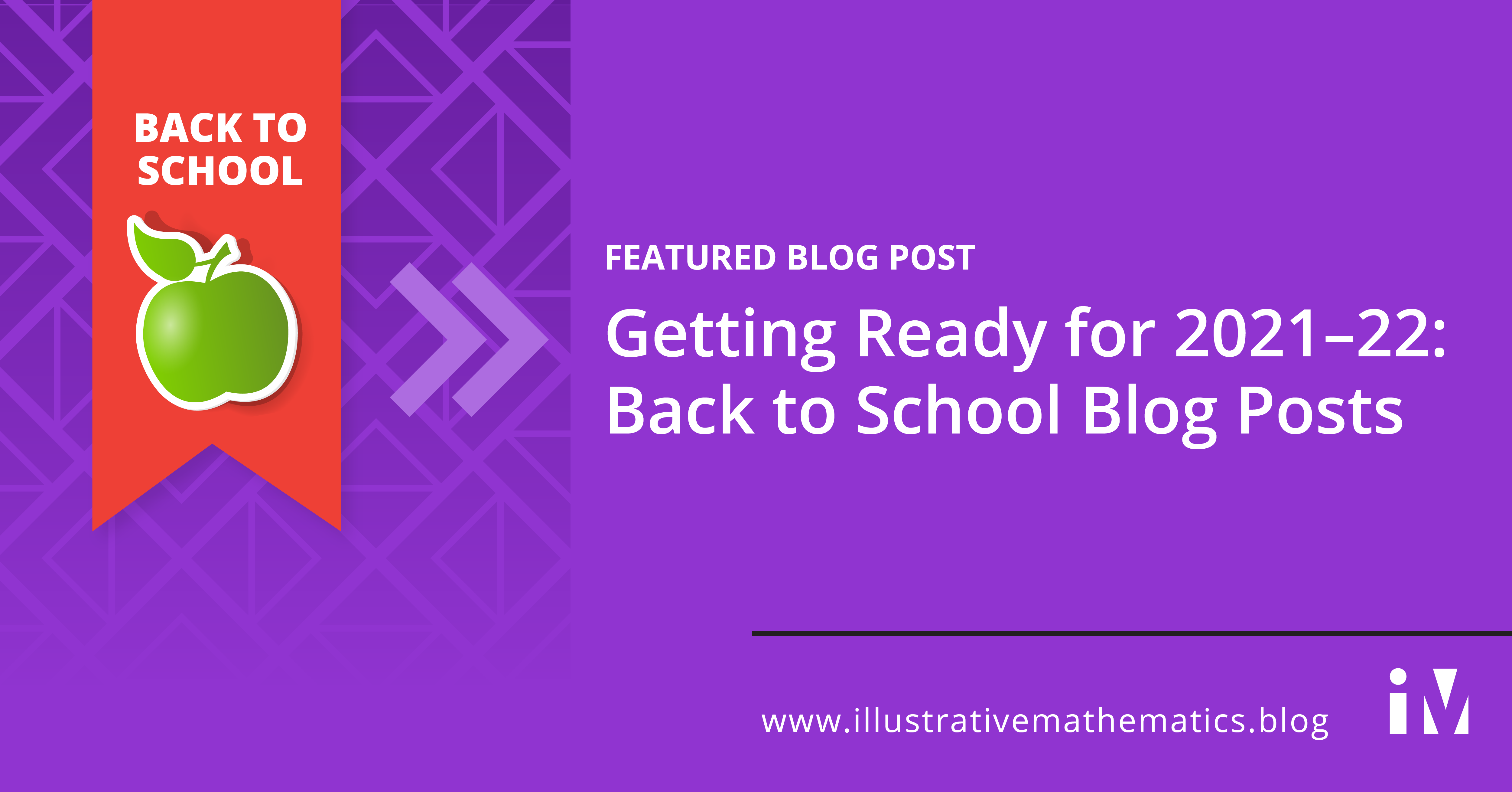By the IM Team
Educators still face a great deal of uncertainty heading into the 2021–22 school year. Maybe you’ve already started planning for it. Maybe you’ve avoided planning for it. Maybe your school year has already started!
No matter where you are in thinking about this new school year, and how you are feeling about it, we would like to support you. To start, we offer this curated collection of back-to-school blog posts. We have organized the post around 5 topics: building classroom community, problem-based learning, lesson planning, instructional routines, and access for all. The focus is on pedagogy and structure. There are also lots of math content-specific blog posts available if you browse through older posts.
Start with one that sounds like a good fit for where you are and what you’re thinking about. The post might anchor your thinking, affirm some of your beliefs and practices, raise new ideas, or have you question prior practices. After you finish reading, you might want to extend the conversation with a colleague from your school or within an online community.
Wishing you all the best this fall!
Building Classroom Community
What do you want your classroom community to look like? Feel like? Establishing norms helps teachers cultivate a community of learners where making thinking visible is both expected and valued. How do you want to start the year?
- Helping Elementary Students Cultivate a Strong Math Community
By Latoya Byrd and Jenna Laib - Building a Mathematical Classroom Community (6–8)
By Kristin Gray, Jenna Laib, and Sarah Caban - Co-Creating Classroom Norms with Students
By Anna Polsgrove, Brooke Braga, and Marcela Aguila - Explicit Classroom Norms to Teach Kids How to Learn from Problem Solving
By Max Ray-Riek
Problem-Based Learning
Problem-based instruction means believing all students can solve problems on their own, and giving them a chance to try. All IM curricula, K–12, are designed to support this. What might this look like?
- What Is Problem-Based Instruction?
By William McCallum - How Do Students Perceive Problem-Based Learning
By Max Ray-Riek - K–5 Curriculum Design Features that Support Equity and Inclusion
By Dionne Aminata - Developing Conceptual Understanding and Procedural Fluency
By Melissa Schumacher
Lesson Planning
Let’s dig into lesson planning! Where do you start? What are some important things to keep in mind?
- First Impressions: The First Units in IM K–5 Math
by Kristin Gray - How Do You Start the Year?
By Ashli Black - Planning Lessons for a Block Schedule
By Jennifer Wilson and Vanessa Cerrahoglu - Exploration in IM K–5 Math: Challenges for Curious Students
By Jen Hawkins and Mike Nakamaye - The Art of Reflection
By Kaneka Turner
Instructional Routines
Instructional Routines have a predictable structure and flow so that students and teachers can focus on the content. They are designed to invite all students to engage in the mathematics of each lesson. Here are a few examples:
- What Is an Instructional Routine?
By William McCallum and Kate Nowak - The Power of Noticing and Wondering
By Greta Anderson - Using Instructional Routines to Inspire Deep Thinking
By Jenna Laib - The 5 Practices in a Lesson Framework: Explicit Planning vs Explicit Teaching
By Kristin Gray
Access for All
All students, each with unique knowledge and needs, enter the mathematics learning community as capable learners of meaningful mathematics. How can educators leverage student strengths to support all students in learning grade-level mathematics?
- Supporting Culturally Responsive Pedagogy with IM K–5
By Dionne Aminata - Updates to Supports for Students with Disabilities and English Language Learners in IM 6–8 Math
By Liz Ramirez - Differentiated Instruction in IM 6–12 Math
By Max Ray-Riek - Equitable Teaching Practices in IM K–12 Math
By Tina Cardone - Building Equitable Learning Environments for Each Student
By Danielle Seabold
Next Steps
What “takeaways” do you have from the blog post(s) you read? How can you make these ideas stickier, to carry them with you into the new school year?
Maybe you want to write something down, either in a physical notebook or a digital one. You might want to chat about it with a colleague, in person or online, e.g. via the IM Community Hub. You could spark a conversation on social media platforms like Twitter or Facebook. Although there is a lot we don’t know about the upcoming school year, we all want to help learners to know, use, and enjoy mathematics.
